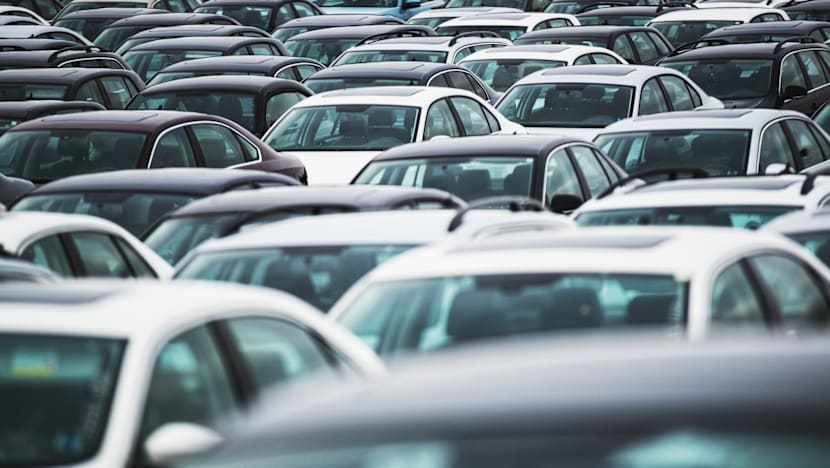CNA Explains: How car recalls work in Singapore
What happens if your dealer shuts down? What if you bought from a parallel importer? CNA's Justin Ong takes a closer look.

A parking lot of recalled cars. (Photo: iStock)

This audio is generated by an AI tool.
SINGAPORE: Questions around the car recall process in Singapore were raised after a court found that a man was killed due to a faulty airbag in his car.
The incident occurred in 2022, when a metal fragment from the steering wheel was lodged in the driver’s head after the airbag deployed.
It is the first such death in Singapore involving a Takata airbag, which was recalled worldwide from as early as 2013 after defects were discovered.
The court heard that the car was sold to the driver by a parallel importer - but the company had closed several years before the incident.
How can drivers find out their vehicle has been recalled?
When a vehicle is recalled, motor dealers or importers need to notify the Land Transport Authority (LTA) and the owners of affected vehicles.
This includes parallel importers, which are non-authorised car dealers that bring in vehicles directly from overseas markets.
Even though they don't have a direct link with manufacturers like authorised dealers do, these parallel importers still need to do their due diligence to keep up to date on published recalls and if any vehicles they sold are affected.
LTA takes action against dealers and importers who fail to fulfil these legal obligations.
If or when LTA is notified by a motor dealer or importer about any vehicle recall, the information gets added to an electronic vehicle recall system platform on LTA’s OneMotoring website.
On this platform, motorists can check whether their vehicle is being recalled; the list of vehicles being recalled; and the status of rectification works for the recalled vehicle.
So are all recalled vehicles on LTA's radar?
It is still contingent on the car dealers and importers informing the authority.
LTA, on the other hand, has no statutory responsibility and assumes a facilitative role in communicating the need for a car recall, according to a representative who testified in court for the Takata airbag case.
Car selling platform Sgcarmart’s editorial manager Desmond Chan said the manufacturer issuing the recall will inform car dealers directly.
But for parallel importers, in many cases the flow of information from manufacturer to dealer does not exist.
“Therefore, it is left to the customer to find out about the recall themselves,” he said.
A staff member from a parallel importer, who declined to name his firm due to the sensitivity of the matter, said: “(Parallel) importers do not have an agreement with the manufacturer ... They will not be aware of the manufacturer’s recall and what cars are affected by the recall.”
President of the Automobile Importer and Exporter Association (AIEA) Keith Oh said that to improve recall rectification rates, LTA has been providing the association with a list of parallel importers with outstanding vehicles to be rectified from Takata Airbag recalls.
"AlEA can help to reach out to remind these parallel importers to follow up with vehicle owners," he said.
He also urged car dealers and importers who are members of his association to actively monitor recalls initiated by manufacturers and make the necessary arrangements to get the vehicles rectified.
What happens after your car gets recalled?
According to LTA's OneMotoring website, owners of affected vehicles will be informed by the dealer or importer; and rectification works will be arranged.
But the latter may not be so straightforward as well.
The employee of the parallel importer said that even if he was aware of a recall, there may be problems accessing the spare parts needed to rectify the vehicle.
He said that in 2014, when the recall of the defective Takata airbags was in full swing, parallel importers had “great difficulties" getting hold of upgraded airbags.
Agreeing, Mr Benjamin Loo, chief operating officer at CarTimes Group, said his dealership has its own in-house workshop where recalled cars are assessed and advice is provided to customers on the next course of action.
But not all dealers have such resources, he acknowledged.
“Not everyone would be able to provide the aftersales support required.”
Mr Loo added that an additional challenge is in car owners themselves receiving recall letters and not acting on them.
What if car dealers close down?
Those who got their cars from dealers or importers who subsequently closed or changed ownership may also not be notified of recalls.
Mr Loo from CarTimes said that when companies close down, owners usually have “no incentive to do anything anymore”.
Agreeing, Sgcarmart's Mr Chan said it was not realistic for shuttered dealers or parallel importers to notify customers of a recall exercise, because “that chain of communication would no longer exist”.
In the case of the Takata airbag death, LTA had reached out to the defunct parallel importer via registered mail, for three different recalls unrelated to the Takata airbag. The letters were returned to LTA.
Mr Oh from AIEA said his association has compiled a list of motor workshops to assist vehicle owners who may be affected by the Takata airbag recalls and have no recourse to their parallel importers who may have ceased operations.
"We encourage vehicle owners to consider engaging these motor workshops for rectification works," he said.
What about secondhand cars?
For secondhand cars, drivers can check their status on LTA's electronic vehicle recall system.
If the car is from an authorised dealer, any recall that has been issued and reported will be reflected accordingly, said Mr Chan.
But if the car is from a parallel importer, or a dealership or importer that has already closed, the same issues may emerge - where the need for a recall may not be reflected.
For secondhand cars, another challenge is that some owners may not have updated their contact details or may not reside in the address where the recall notifications are sent to, said Mr Oh.
"We urge vehicle owners to update their contact details and arrange for their vehicles to be rectified as soon as they receive recall notifications from our members," he said.
What more can be done?
Associate Professor Jawn Lim from the Singapore Institute of Technology's business, communication and design cluster said there was an “over-dependence” on dealers to inform car owners about recalls.
“This system becomes volatile when dealers close or change ownership,” he said. “There is a need to reduce reliance on such volatile links in the system.”
He said contact details such as company names, emails, or phone numbers often change.
Assoc Prof Lim said one solution could be to use a car’s on-board unit (OBU), the device that powers ERP 2.0, to notify drivers about recall alerts immediately.
Another possible option is to require vehicle inspection stations to maintain an alert list of troubled cars, he added.
“This way, during regular inspections before road tax renewals, owners can be reminded or notified of any manufacturing faults that must be rectified,” he said.
But Mr Chan from Sgcarmart said potential policy changes were unlikely, as it would require a high level of information regulation by LTA.
“Ultimately, that's one of the realities of the grey market, and a compromise that customers need to accept,” he said.
















